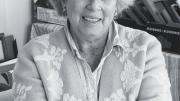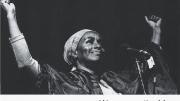Photographer Diana Mara Henry ’69 is focused on preserving the images she has spent more than 40 years capturing and protecting. She’s shot so many faces synonymous with history and change: Coretta Scott King, beaming and applauding; a young absorbed Bill Clinton at the 1972 Democratic National Convention; a backpack-toting Andy Warhol. Some of these memorable images appear in her recently released book of her photographs, Women on the Move (Natzweiler Press; www.womenonthemoveonline.com/ Women_on_the_Move_book.html). Radcliffe Institute Librarian Marilyn Dunn, executive director of the Schlesinger Library on the History of Women in America, calls Henry’s photographs of the National Women’s Conference in 1977 “among the Schlesinger’s most valuable visual treasures. Students and scholars…are able to see in these pictures that feminists come in a wonderful diversity of colors, shapes, and styles.”
Although much of Henry’s photography has involved documenting political figures, feminists, and activists, her true passion is history and the collection of ephemera. “People want to pitch me or see me as a feminist,” she says, “I see myself as more of a historian and an artist.” At many of the events she covered, such as the 1974 demonstration outside the offices of The New York Times to demand the paper start using the honorific “Ms.,” she says she was the only photographer present.
Vietnam veteran Ron Kovic, author of Born on the Fourth of July, has said of her work, “I believe these photos...will be looked at and studied just as Mathew Brady’s classic and haunting Civil War photos are today.” Henry appreciates the sentiments. For decades, she had been careful to protect her negatives so eventually she could donate them to libraries. “These are historical records that photographers are not recognized for, I think, sufficiently,” she declares. “But we do write history and we write it with light, and I hope that aspect of historical record will gain more recognition as time goes on. I think we’re just at the beginning of that.”
Henry learned at a young age the power of images and of their ability—at their most effective—to transform opinion. Her father, Carl Henry ’34, was a businessman who often pointed out how advertising “conveys a message and manipulates the consumer” through images and words. His lessons helped mold how Henry captured the world behind the camera.
She was a photo editor at the Crimson from 1967 to 1969. After graduation, she freelanced in New York City for Forbes and The Village Voice. In 1977, she was the official photographer for both the President’s Commission on International Women’s Year and the National Women’s Conference, which drew more than 20,000 participants to Houston. She taught courses at the International Center for Photography. In 1987 Henry, newly married, moved to Carmel, California. There she turned her creative energies away from her Rolodex and toward motherhood. When she had time she taught photography classes.
She now lives in Vermont, trying to assure her role in history by arranging to donate her work to the Smithsonian Institution and the National Archives. Recently, she provided archival material for a PBS documentary on American women, Makers. She’s also collaborating with the Special Collections and University Archives division of UMass Amherst, which has more than 10,000 examples of her work, some as yet unprinted. Henry reports that she is now working with the library to scan 2,000 unprinted black-and-white images onto the UMass website under the provisional title “As Yet Unseen.” “Mostly libraries only work with dead photographers, so they would be scanning images not really knowing what the photographer intended,” she explains. “In this case, I think we have a partnership that brings forward a new body of work.” She is excited at the prospect. “Even though I’m working with images that were made a long time ago,” she says, “there’s still a sense of discovery and of new possibilities.”









